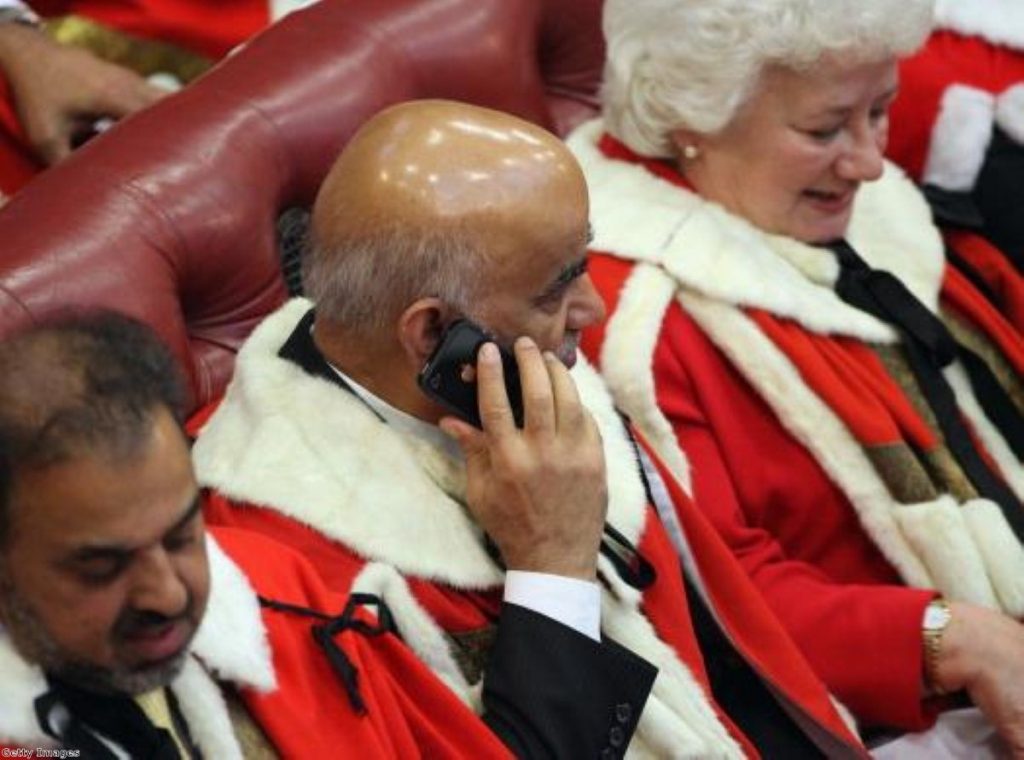Analysis: Westminster braces for the mother of Lords reform battles
It might sound like a cliché to say that the Palace of Westminster is a hotbed of intrigue, but that is very much the case as the Lords reform battle begins in earnest.
There isn't actually that much to report from the Commons itself. A minor government official stood up and announced the first reading of the House of Lords reform bill. There were no debates and no divisions. Another long Westminster day wears on.
Outside the chamber the atmosphere is undeniably different, however. Copies of the government bill were available almost immediately after prime minister's questions. Journalists, politicians and their researchers have scurried away, clutching the much-anticipated papers, scanning the fine print for black-and-white evidence of government concessions (actually it's black-and-green, as bills are printed on coloured paper). David Cameron, Nick Clegg and co want to replace the appointed Lords we've got at the moment with a mainly elected second chamber. Its size will be cut down to around 450 peers, elected using a form of proportional representation to large regional-sized electoral districts.
Wherever you wander through parliament, groups of MPs and peers can be found. They're plotting.


It's not often that the entirety of Westminster is gripped by a single issue. It takes something huge, like the Iraq invasion debate or the tuition fees protest, to focus the collective mind of an institution. Lords reform can be added to the list of topics which have grabbed attention. This matters to all the politicians gathered in parliament, whether MPs or peers. Even more importantly, the outcome of this debate is far from guaranteed.
This is a Liberal Democrat proposal, so its apparatchiks are doing all they can to talk up the bill's chances. It's a part of the coalition deal, they're saying, in an attempt to steamroller through Tory opposition. The tactic might not work. Such is the fevered anger with which some sections of the Conservative party view these changes that a monstrous government rebellion seems inevitable. How big will that rebellion be, though? There's a few weeks to go until the first crunch votes. Already the lobbying and the cajoling has begun.
Much depends on the attitude of the Labour party. It has adopted an unusual approach to the proposals, by trying to have its fudge and eat it too. Yes, the bill itself will be supported by Labour. But the government's timetable motion to ram the legislation through parliament is going to be resisted. Labour wants a full debate on what is an important issue. That's reasonable enough, right?
Not if doing so effectively prevents the legislation from becoming law. Constitutional experts think the bill will be "dead" if the timetable motion fails. Labour, then, faces a struggle of conscience between high-minded principle and low-brow politicking. Its actions seem equivocal, which may in part reflect the pressures faced by Ed Miliband's leadership.
The ministers trying to get the reforms through – deputy PM Clegg and his Tory ally, Mark Harper – are playing a very long game. They know that getting legislation through parliament takes a while and, while they've already made some concessions, still have plenty more leeway to make further U-turns. Details like the number of bishops to be allowed in the second chamber, and the size of the 'electoral districts' which members of the Lords will represent, and the voting system used to decide who gets what – these are the frontline issues where the coalition can be challenged and, potentially, browbeaten into submission.
All those debates are to come. For now, the realisation that the coalition actually means business is slowly sinking in. The Tory leadership seems united with Lib Dem colleagues on forcing the bill. This fight really is going to happen.
Achieving the ideal unity in the Commons is nearly impossible, but the coalition seems to want a more pragmatic, achievable goal: a majority. Then the bill can go to the Lords, which will reject it outright. 2012 will turn into 2013. This time next year the Commons could be forced to use the Parliament Act to get its way. It could take until the spring of 2014 for the government to finally get its way.
Remember today. June 27th 2012 go down in history as the day that the mother of all parliamentary struggles began. MPs and peers seem to be aware of that, and are readying themselves for the fights to come.

